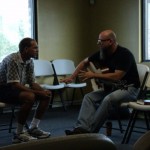Why should we let THAT PERSON speak to the church?
In my previous post, “I did NOT expect God to do THAT,” I reflected back on our study of Hannah’s prayer in 1 Samuel 2. As I said, her prayer indicates that God often works through ways and people that we do not expect. It reminded me of something Paul wrote in 1 Corinthians 1:26-29.
Both of these passages remind us that often God does not work in the ways that we expect, and often God does not work through the people that we might expect.
But, how should this reminder (and pattern that we find throughout Scripture) affect the way that we gather together as the church?
Who do you expect God to use when the church gathers together? Through whom do you expect God to speak and exhort his church when you gather together? Before you answer, think about how you gather with the church. How does your pattern and methods of gathering together indicate your answers to those questions?
For most churches, the answers are apparent. When the church gathers together, we expect that God will use and speak through certain leaders, but not through others. These are our expectations, and those expectations are readily indicated by the way that we meet together and especially by who is allowed to speak and the prominence that is given to that particular time of speaking (i.e., the sermon).
But, what if – as the passages above and many other passages indicate – God truly does desire to work through and speak through “unexpected” ways and through “unexpected” people?
I’ve witnessed this time and time again as we meet together as the church. As different people speak and exhort and teach and admonish, God often chooses to speak through the most unexpected person or through an unexpected illustration or example. A child? Yep. A new believer? Yes. A woman? uh huh. Even an unbeliever?
Would God really speak to his church through an unbeliever? Wow… that would be totally unexpected.
Of course, for many Christians, the assumption would be that I’m talking about a child, or a new believer, or a woman, or an unbeliever delivering a 30-45 minute sermon. That’s not the case. God does not need a sermon or 30-45 minutes or a seminary-trained professional or a pastor/elder to speak to his children.
However, he does want his children to be willing to listen to others… to be open to him working through and speaking through unexpected channels.
When Paul is instructing the church in Corinth about speaking and serving when the church gathers (1 Corinthians 14), he gives a few guidelines, such as doing so in love and for the purpose of building up the church. But, throughout that chapter, it’s clear that he expects God to work through many of the people gathered together.
What are our expectations when we gather with the church? Do we expect God to work through one or two, or through any who gather with us? Do we expect God to work through us?
The way that we answer those questions will affect that way that we gather with other believers. And, the way that we gather with other believers indicates how we truly answer those questions.
Celebrity Christians and how they influence us
Jamal at “illuminate” has written a very good post called “Cliques, Celebrity Leaders, and The Disease of Hierarchy.”
In his post, Jamal warns against “following” certain people because of their celebrity status, even Christian celebrity status. These people could be popular church leaders, authors, conference speakers, or even bloggers.
He offers three warnings at the end of his post:
1. Beware of ‘selective associating’ and ‘selective name dropping’
2. Beware of giving false honor and respect to those on the leadership ‘stage’
3. Beware of comparing yourself to others, & stop comparing your brothers and sisters in Christ to one another
I want to continue Jamal’s discussion by adding one more “warning” to his list: 4. Beware of “following” people that you do not actually know.
What am I talking about? For 99.9% of us, we do not actually know the big name authors, church leaders, conference speakers, or bloggers. We know what they’ve written or what they’ve said, but we do not know them. We do not know how they actually live; we only know what they SAY about what they live.
By the way, I’m not saying that these people DON’T live in a way that honors God. I’m simply saying that we do not KNOW how they live.
Also, for those who find themselves in the Christian spotlight, I offer this additional warning: 5) Beware of presenting yourself as an example to people with whom you do not actually share your life.
God has placed people in our lives already who can offer good, real, living examples of what it means to follow Jesus Christ. These are the people who should influence us the most as we follow Jesus Christ ourselves.
I did NOT expect God to do THAT
As I’ve mentioned a few times, we’re studying 1-2 Samuel together with the church on Sunday mornings. Last Sunday, February 12, 2012, we discussed 1 Samuel 2. This chapter begins with Hannah’s prayer after she leaves Samuel at the tabernacle.
There is another “prayer of Hannah” in 1 Samuel 1:11 that is more popular and familiar. But, when we studied her prayer from 1 Samuel 2:1-10, I found something extremely encouraging. In the long central section of the prayer (1 Samuel 2:4-8), she reminds herself (and those listening/reading) that God often works in ways that we do not expect.
We expect the strong to do mighty works, not the feeble. (1 Samuel 2:4) We expect the poor to beg for food, not the rich. (1 Samuel 2:5) We expect the dead to stay dead. (1 Samuel 2:6) And, it continues. In other words, God often chooses to work in ways and through people that we would not choose ourselves.
When I read through this prayer, I was reminded of something that Paul wrote:
For the foolishness of God is wiser than men, and the weakness of God is stronger than men. 26 For consider your calling, brothers: not many of you were wise according to worldly standards, not many were powerful, not many were of noble birth. But God chose what is foolish in the world to shame the wise; God chose what is weak in the world to shame the strong; God chose what is low and despised in the world, even things that are not, to bring to nothing things that are, so that no human being(1 )might boast in the presence of God. (1 Corinthians 1:25-29 ESV)
Of course, Paul was probably referring back to another Old Testament passage. (Jeremy 9:23-24) But, the point is similar: God often works through the weak, the unknown, the “foolish” in a way that confounds those who are witnesses of this work. Why? So that no one can boast in themselves. So that we can only boast in the Lord.
Is this just an interesting point to notice in Scripture? No, I don’t think so. Instead, I think these passages – and a multitude of passages that teach a similar point – should help us understand how God often chooses to work and should affect the way that we expect God to work through one another and others.
Are we only expecting God to work through the “expected” channels? Are we giving opportunities for God to work through other people, or only those we “expect” God to work through? Do we need to change our expectations?
It’s amazing, really, what happens when we begin expecting God to work in unexpected ways and through unexpected means… even when we expect God to work through “unexpected” people.
If we embrace the fact that God actually works in ways that we would not expect (and that would seem contrary to normal wisdom) then this would affect how we meet with one another as the church. I’ll share more about that in tomorrow’s post.
Have you ever seen God work through someone in an unexpected way? Are you giving God opportunities to work through unexpected people in unexpected ways? How?
We are intricately connected with all members of Christ’s body
Bobby at “Deconstructing Neverland” wrote a wonderful post about our community and fellowship in Christ. The post is called “Quarantine and Community.”
According to his post, Bobby’s family has been going through a time of “quarantine” because of sickness running through the family. This time of isolation helped him think about community in Christ.
At one point, Bobby writes this:
The Body of Christ is not confined to the membership roles of those who gather at a particular location. Even if that is how a person thinks of it, it is not true. We are all inter-connected with one another and we all receive life and instruction from the same source, the Head. My eyes have been opened to the beauty of being a member of the Body of Christ. Even as someone who has abandoned traditional church services and doesn’t have his name on any membership roles, I am still intricately connected with, necessary to and dependent upon the other members of Christ body. As long as I remain attached to Christ the Head I also remain attached to all those who are attached to Him as well. Even if I’m not attached to a pew every Sunday. The fullness of Christ lives in each one of us and in Him we all live and move and have our being…together. We can be separated by wide areas of geography and still be one and share the same life while two others can sit side by side but feel miles apart inside. It all depends on the level at which we abide in Him.
This touches on many of the issues that I’ve been thinking about and writing about lately. Let me make it more specific: Bobby is not officially a member of any “traditional church service,” but – through Christ – he is a member together with those who are part of traditional church services.
I agree that we are intricately connected with everyone who is in Christ, even those that we will never meet. However, like a chain link fence, we are more closely and obviously dependent upon those that are closest to us – those who we interact with as we live our lives together.
If we refuse fellowship with someone who is in Christ and who is also in our lives, then we are refusing to be a channel for Christ and refusing to heed a channel that Christ can use. We are, in effect, hindering the maturity of Christ’s body.
So, how can we practically foster and demonstrate these intricate connections that we have with one another through Christ, even when we are NOT connected to one another through official church membership?
I owe you love
Punctuation is very important in the title of this post. The title of the post is “I owe you love.” The title is NOT “I owe you, love.” There is a difference.
(As an aside, I wanted to call this post “IOU <3" but I was afraid that some people wouldn't get it. My family would get it.) Like many people, I have a love/hate relationship with St. Valentine's Day. Many (many) years ago, I had a creative brainstorm, and I did something for St. Valentine's Day that blew away my wife. (I'm not bragging... I'm not romantic. It was quite abnormal for me.) Anyway, since that year, I've always felt pressured to "live up" to that St. Valentine's Day, I've never felt any new idea even came close, so I've typically given up and punted to the card and/or candy deal. This post is not really about St. Valentine's Day. I mean, if I had forgotten to get my wife something for St. Valentine's Day, then I could have called this post "I owe you, love." But, I didn't. The post is called "I owe you love." However, it was in thinking about St. Valentine's Day that I was reminded of a short command written by Paul to the Christians in Rome. (Yes, it is a command, interestingly enough.)
Owe no one anything, except to love each other, for the one who loves another has fulfilled the law. (Romans 13:8 ESV)
Think about that for a moment: Owe no one anything, except to love each other.
I owe you something: love. It’s true. I owe you love. Not because you loved me already, or because you deserve to be love. I owe you love because love has been so lavished upon me by God. I repay him (not really, but that’s the symbolism) by loving you and others. I respond to his love by loving others.
It really is that simple.
And, it really is that difficult.
Because, I can’t choose who to love.
And, because I can’t “settle” this “debt.”
If I’ve shown you love every day for last 10 years… I owe you love.
By the way, the “you” in the statement “I owe you love” is general. I may not be able to show love “you” specifically. I may not meet you today, and I may not even run into you during this lifetime. But, when I do come across someone, I owe love to that person.
Interestingly, as difficult as it is to owe people love, it is never presented as a burden in Scripture. Instead, showing love is always presented as a privilege and a joy. I wonder… if I’m struggling to show someone love… perhaps there’s a problem with the source of my love.
Anyway, that will have to wait until another post. For now, I just wanted to remind you and me, that we owe each other love. And, we owe other people love.
Yes, that person right there. You owe that person love.
Is the church for misfits?
Dan at “Cerulean Sanctum” has written another excellent post called “Misfits of the Church.” (If you remember, a few weeks ago I linked to another great post in my post “People want real examples of organic church life.”)
In this latest post, Dan asks about “misfits” in the church – as you can tell from the title of his post. Who are the “misfits”? Well, according to Dan, these are people who just don’t “fit” into the current programs or organizations of the church.
He describes some of these misfits:
The one who creates beautiful art but who is told she can’t display it in the church building.
The one who hears from God but who is told such words are not appreciated.
The one who can see the roadblocks preventing growth and ways around them but who is despised because he is not ordained.
The one from the “rough background” who is forever limited by those who cannot put aside what he once was and did.
The one who failed once and will never be given a second chance.
The one who doesn’t agree with every denominational position and so will never be considered for leadership.
The one who warns people, who prefer the status quo, of the dangers ahead.
The one with great vision who is surrounded by those with little or none.
The one with many flaws but who loves people abundantly and unconditionally, just like Jesus did.
The one who is always serving, though not with the imprimatur of those in charge, and who makes them look bad for doing so.
As Dan says in his post, people who fall into the categories above – and many other categories – often “leave the church” because they do not fit in.
Dan ends his post with the following statements and questions:
I keep encountering more longtime Christians who are giving up. They’re not abandoning Jesus; they simply don’t know how to fit within the typical church. And it’s not for trying. I know these people have tried. But they’re weary of always receiving the left hand of fellowship, and they despair of ever contributing their God-given gifts because The Church™ does not want those gifts or it places ridiculous qualifications on their use that have no basis in Scripture and every basis in human selfishness and pride.
We talk, talk, talk, and talk about community in the Church, but what kind of community do we really have when someone is told to stop being the person God Himself is making him?
The Kingdom of God is filled with misfits, so how come our churches aren’t?
I want to echo something that Dan said above: the kingdom of God is filled with misfits. In fact, in a way, we are ALL misfits. Unfortunately, many church organizations have been designed for only a certain kind of misfits. Other misfits are too misfitted to join in.
Like Dan said, there’s a huge problem with that.
Can you think of ways that churches can open themselves up to other kinds of misfits?
Guest Blogger: Simple Church (TM)
Last year, I invited several people to write “guest blog posts” for this blog. There are several reasons for this: 1) To offer different perspectives. 2) To generate even more discussion and conversation between blogs. 3) To introduce other bloggers to my readers.
(While I may continue to invite people to write guest posts, I would be willing to publish *almost* any post related to the church. If you are interested in writing a guest blog post, please contact me at aknox[at]sebts[dot]com.)
Today’s post was written by Joe (JR) Miller. J.R. Miller is a former church planter and now professor living in San Diego, California with his wife and three sons. He is an author and avid blogger. You can reach him at either www.MoreThanCake.org or www.EmergingLife.org.
————————————
“Simple Church ™”
Inspired by my friend Alan’s post “Just Make Disciples ™“, I am convinced that church is meant to be simple. All the institutional stuff has really hurt our Faith. Here is my new motto:
Church–So Simple That Anyone Who Follows Me Can Do It!
Why do we hold men above Christ?
Seminary trained pastors set themselves up as experts by writing books that teach us all kind of pagan things about leadership and community when all we truly need is the Bible. I am so convinced that the Bible is ALL we need, that I am commissioning a team of writers with no seminary training and who have never lead anything to write a book that everyone should read. This team of experts (with names you are sure to recognize) well give everyone all they need to know about how not to be a leader and how to avoid training so you can start a Simple Church. Oh, and we will have a magazine too!!
Why do we need all those conferences for “professional” clergy?
Those conferences are corrupting the church and taking away the priesthood of all believers. To counter this spiritual-tragedy, I would like to invite everyone to a new conference starting next year. The conference will be titled, “No More Conferences“. We will feature worship bands (unprofessionally led of course) and lecturers who will teach us how sermons are bad because they feature just one guy talking with everyone in chairs facing forward. Our conference will be held in a theatre where everyone will have nice chairs facing the stage so they can enjoy our featured experts. Come to the conference and you will get trained by our totally uneducated and fully untrained experts on how to be a Simple Church leader.
Why do we make paid preaching/teaching the center of our faith?
I think it is terrible that we listen to sermons and download them and sell them when the Gospel should be free. If you want to learn more, check back tomorrow and I will have a recorded talk you can download for a small fee or you can always order the CD. The Apostle Paul never sold his letters to the church and next year I will also have a new copyrighted book out on Amazon that will tell you all about it for just $9.99. These teachings will explain how we are destroying the church by trusting preachers who sell stuff all the time. (BTW, since I am not a paid preacher, I am allowed by the New Testament to sell this stuff… besides, my motives are pure unlike those other guys.)
Why have we made it so difficult to be the Spirit-led Church?
Men have put themselves out as leaders and make us think that unless we read what they write, we cannot be a valid church. That is just not how God works. So I am announcing the launch of a new blog that will feature all my books and all my recorded messages from conferences and weekly posts. My site will teach you how not to follow after the teachings of men. Trust only the Holy Spirit and follow me.
Why do we follow denominations?
Simple church will be all about rejecting denominations and seeing everyone as our brother and sister in Christ. To help you figure out which churches are truly simple, and not heretical like those institutional ones, we will set up a network of Simple Churches. We will have memberships and everything and promote our approved network of churches from our website.
Why do we meet in big buildings?
Anyone who reads the New Testament, or church history, knows that aside from meeting in public buildings or in Synagogues or caves, the church only ever met in homes. If your church is meeting anywhere but a house, you are corrupting God’s simple church because the house is God’s designated place for church meetings. A house is the only place that does not restrict the moving of the Spirit and A house is the only place where people won’t get corrupted by all the bad stuff. (You will learn more about this at next years’ big conference)
Church is Simple and anyone can do it!! So keep reading. listening, conferencing, networking, meeting in homes and downloading my stuff and I will teach you all the things you need to know about how to keep church simple and avoid the institution.
Oh, and don’t forget, if you don’t read all my stuff and listen to all my messages and go to my conferences, you will never know what stuff is forbidden by the New Testament and you will never be free from all the institutional stuff that holds you back.
Scripture… As We Live It #195
This is the 195th passage in “Scripture… As We Live It.”
(This re-mix was inspired by my friend Lew.)
When they had finished breakfast, Jesus said to Simon Peter, “Simon, son of John, do you love me more than these?” He said to him, “Yes, Lord; you know that I love you.” He said to him, “Pay a full-time minister to Feed my lambs.” He said to him a second time, “Simon, son of John, do you love me?” He said to him, “Yes, Lord; you know that I love you.” He said to him, “Pay a full-time minister to Tend my sheep.” He said to him the third time, “Simon, son of John, do you love me?” Peter was grieved because he said to him the third time, “Do you love me?” and he said to him, “Lord, you know everything; you know that I love you.” Jesus said to him, “Pay a full-time minister to Feed my sheep.” (John 21:15-17 re-mix)
(Please read the first post for an explanation of this series.)
Replay: Spiritual gifts and the gathered church
Five years ago, I wrote a post called “Spiritual Gifts and the Gathered Church.” God gifts all his children in ways that he can work through them to build up others. Think about that a moment: “to build up others.” That assumes that God’s children are given opportunities to speak to and serve others when they are gathered together.
It seems simple and straightforward, but it’s a “radical” idea among the church today. I think that’s very unfortunate, and I think that the church is hindered in their growth because of it.
————————————
“Spiritual Gifts and the Gathered Church”
One of the most interesting books that I have read in the last few years is Paul’s Idea of Community (Peabody, MA: Hendrickson Publishers, 1994) by Robert Banks. In one part of this book, Banks discusses the purpose of Spiritual gifts for believers, especially when believers are gathered together:
We have seen how gifts were distributed to every member of the community by the Spirit and that through their mutual sharing these were exercised amongst them. Guidance on matters affecting the community’s life was principally granted to members when they met together to discern what God required of them. They received this guidance from the Spirit through their exercise of gifts of knowledge, revelation, wisdom, and so on. In all this Paul never tires of insisting that every member of the community has the responsibility to impart the particular insights they have been given…
Thus, the most characteristic setting in which the community received guidance was when Christians assembled to share and evaluate the gifts given to them. Here, in a variety of complementary ways, the guidance was conveyed through each to all and through all to each.
Both nurture and discipline within the congregation, then, should arise spontaneously from the concern of every member for the quality of its life and the involvement of every member in decisions affecting the whole. (137-138)
Banks describes exactly what Paul writes about in 1 Cor. 12:7: Spiritual gifts are given for the benefit of others, not for our own benefit. Perhaps, Acts 13 includes the best biblical example of the Spirit communicating to the community through the gifts of those within the community:
Now there were in the church at Antioch prophets and teachers, Barnabas, Simeon who was called Niger, Lucius of Cyrene, Manaen a member of the court of Herod the tetrarch, and Saul. While they were worshiping the Lord and fasting, the Holy Spirit said, “Set apart for me Barnabas and Saul for the work to which I have called them.” Then after fasting and praying they laid their hands on them and sent them off. So, being sent out by the Holy Spirit, they went down to Seleucia, and from there they sailed to Cyprus. (Acts 13:1-4 ESV)
Notice that it was in the context of exercising spiritual gifts (i.e. to the benefit of other people – 1 Cor. 12:7) that the men were serving the Lord. (Now, I know that the ESV says the men were “worshiping”, but the word is probably better translated “serving”.) While they were serving people and the Lord, the Spirit communicated both to the men being sent, and also to the church. The men listened, and the church listened. The Spirit spoke. The people responded. Interesting, this passage says that both the church “sent” the men and that also the Spirit “sent” the men.
Scripture only gives two requirements for someone to exercise their gift when the church is assembled: whatever they do must be motivated by love (1 Cor. 13) and must edify the church (1 Cor. 14:26). No gifts should be refused, and no gifts should be elevated above the others – as long as the gifts are used to edify other people. Similarly, the people should be given the opportunity to use their gifts when the church is assembled, and they should be reminded that God holds them responsible for this. In other words, if someone is in charge of the meeting time, that person should make sure that others are given opportunity to edify the church. And, the people gathered should be reminded that God wants them to participate and expects them to participate in building up the body.
Do you expect God to communicate to you through the Spiritual gifts of the entire body, or just through the gifts of a few leaders within the body? Do you expect God to communicate to the church through the Spiritual gifts that he gives you? Are you obedient to God in building up his church and allowing others (with different gifts perhaps) to have the same opportunity?
When the church gathering is not dependent on a robust spiritual life operating in all its members
Like many others, I encourage “every member ministry.” Of course, this looks different to different people, and it should look different in different contexts. But, there are similarities, such as the opportunity for everyone to talk part (speaking and serving) when the church gathers together.
Josh at “Called to Rebuild” is talking about this in his latest post “Are our gatherings truly an expression of the church which is His Body?”
I think that Josh expresses this view of “every member ministry” very well, and better than I have in the past. For example, at one point he says:
Most of the gatherings you’ll ever walk into would be entirely unaffected should you continue to show up week after week and never participate in the meetings or community life. Ironically, though it is designed for you (and for the other people present) the show would go on with or without you just the same. It is not dependent on a robust spiritual life operating in all its members resulting in a healthy, moment-by-moment functioning of the Body as a whole. Rather, it is carried on mostly by a select number of staff members aided by the volunteer labor of a few eager laymen.
Think about it… if “the show would go on” exactly the same whether you were there or not, then are you truly part of that church gathering? Not really. You’re more like a person watching a movie at the theater than someone taking part in the gathering of the church.
But, what a difference it makes when every follower of Jesus Christ is given the opportunity to let the life of Christ flow through them and into the others gathered together!










